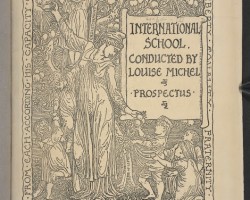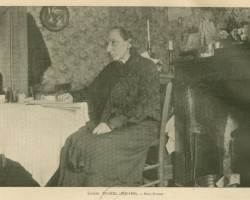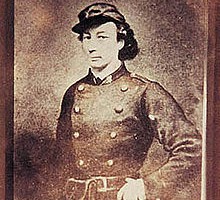Posts Tagged ‘Louise Michel’
-
The Red Virgin and the Vision of Utopia: book review
0May 8, 2016 by Lydia Syson
Regular readers of this blog will be familiar with Louise Michel, teacher, poet and revolutionary heroine of the 1871 Paris …
keep readingCategory News | Tags: Bryan Talbot, Charlotte Perkins Gilman, Dotter of Her Father's Eyes, Graphic novel, Liberty's Fire, Louise Michel, Mary M Talbot, Paris Commune, The Red Virgin and the Vision of Utopia, Utopia
-
In the footsteps of Communards
0July 6, 2015 by Lydia Syson

What happened to the revolutionaries who managed to escape Paris after the bloody fall of the Commune? Over three thousand …
keep readingCategory News | Tags: anarchists in Fitzrovia, international school, Liberty's Fire, Louise Michel, The History Girls
-
‘The Red Virgin’
0June 23, 2015 by Lydia Syson

There is a character in Liberty’s Fire who is not named, but can be easily identified as Louise Michel, the best known …
keep readingCategory News | Tags: English Anarchists, Fitzrovia, Fitzrovia Festival, French in exile, Henry Nevinson, international school, Liberty's Fire, Louise Michel, Margaret McMillan, N.F.Dryhust, Paris Commune
-
Citoyennes: women of the Paris Commune
0May 5, 2015 by Lydia Syson

The mythical figure of the pétroleuse, hideous or heroic depending on your point of view, has now almost been forgotten. For …
keep readingCategory News | Tags: André Léo, Anna Jaclard, Citoyennes, Communardes, Elizabeth Dmitrieff, International Workingmen's Association, Liberty's Fire, Louise Michel, Marie Ferré, Montmartre, Nannie Dryhurst, Nathalie Lemel, New Caledonia, Paule Mink, Union des Femme, Vigilance Committee, Women in Paris Commune
-
Coming up…
2April 12, 2015 by Lydia Syson

Lots of good things happening this month and next… On Tuesday 14th April the Anne Frank Trust will be at …
keep readingCategory News | Tags: #notsilent, #UKYADay, Anarchist school, Anne Frank, Anne Frank Trust, Competition, Countdown YA, David Rosenberg, Days of Hope, family history, Family Tree, Fitzrovia Festival, giveaway, Louise Michel, Philosophy Football, Rebel Footprints, Spyfever, UKYA
-
Find out more about about the history behind Liberty’s Fire
0March 2, 2015 by Lydia Syson

‘What is the Commune, that sphinx so tantalizing to the bourgeois mind?’ (Marx:The Civil War in France) Simply put, the …
keep readingCategory Reviews & more | Tags: 1871, Books about Paris Commune, Citoyennes, Communardes, Communards, Franco-Prussian War, further reading, Liberty's Fire, Lissagaray, Louise Michel, Paris Commune, Paris Commune bibliography, photography, reading list, Revolution, Siege of Paris, Vallès, Women

